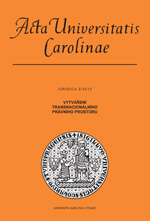Účel a efektivita regulace (usměrňování) hospodářské soutěže
Purpose and Effectivness of Competition Law
Author(s): Luboš TichýSubject(s): Law, Constitution, Jurisprudence
Published by: Univerzita Karlova v Praze, Nakladatelství Karolinum
Keywords: economic competition; regulated branches; aim of competition; consumer prosperity; effectiveness of economic competition; comparison of the Czech Republic, Poland and Hungary
Summary/Abstract: For the solution of the conflict of economic competition with other phenomena as there are e.g. the basic freedoms, it is necessary to define the aim of competition law as a tool of competition regulation. In the context and with the background of the conflict with the basic market freedoms we will deal with the concrete problem of finding a solution to the problems of completion on the regulated European markets. In the second part of our work we deal with the effectiveness of competition law, whereas first we will define this term, then explain the means of effectiveness measurement and apply such a model onto the development of competition law in the Czech Republic, Poland and Hungary. Regarding the question about the aims of economic competition law we come to the conclusion that the regulation of competition serves primarily the competition itself by assuring its existence and contributing to its effectiveness. For the competition as such the existence of the basic market freedoms have a very fundamental character. Any limitation of the basic market freedoms also has a negative effect on competition itself. Parallel trade is an expression of free entrepreneurial will which uses the difference in price levels and thus contributes to effective competition. Its limitation is possible as an exception from the general prohibition and this only under the conditions of advantages for the consumers and the development of the branch involved, especially in the form of investments into its development and research. This conclusion, i.e. the linking of these two priorities applies especially to the area of regulated markets as there is for example the pharmaceuticals market. From the view point of the individual aspects of effectiveness measurement it is possible to arrive at the following conclusions: a) The level of detail of legislation is not in a causal relationship with the level of effectiveness. The most detailed is the Hungarian legislation, whereas the Czech legislation is somewhat detailed and the Polish one is somewhat brief. b) The level of detail is, however, in direct correlation to the abundance of case law which is demanded by the application. Therefore, the Polish Republic has the most abundant case law which in its scope as well as its content may rival the European legislation. c) For the effectiveness of legislation its flexibility, the possibilities of decision making and the broad level of discretion in decision making is significant. Especially the Polish, but also the Czech legislation allow for a relative broad leeway for the discretion of the regulatory authorities. d) The significance of economic aspects is the highest in Hungary, but also the Polish and Czech legislations contain more economic aspects than the European legislation. (...)
Journal: Acta Universitatis Carolinae Iuridica
- Issue Year: 58/2012
- Issue No: 2
- Page Range: 119-136
- Page Count: 18
- Language: Czech

